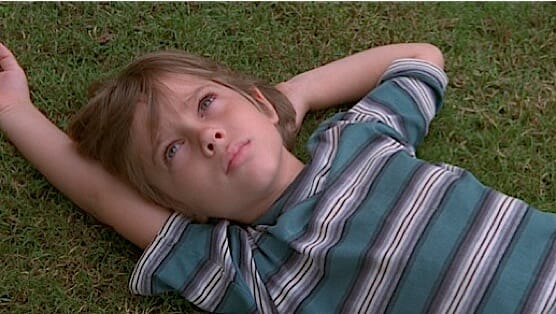Boyhood

Of all the achievements in Richard Linklater’s career, perhaps what he will be best remembered for is his depiction of time. Dazed and Confused chronicled teenage life with precision, but his Before trilogy showed how the passage of time shapes and changes people in ways that they can’t see, precisely because they’re on the inside, lacking the necessary perspective easily available to us on the outside. Now with Linklater’s new movie, Boyhood, time is examined in a new, incredibly moving way. As is Linklater’s custom, Boyhood is profound in such a casual way that its weighty themes feel nonchalant, effortless. This movie might make you cry for reasons you can’t quite articulate. You won’t be alone in feeling that way.
Boyhood has been a pet project of Linklater’s for more than a decade. It has a catchy hook: Every year or so, Linklater would gather with his cast to film the story of a young boy, Mason (Ellar Coltrane), as he goes from childhood to his high school graduation. Letting the story evolve over time and drawing on the experiences of his actors, Linklater has essentially recreated his Before trilogy, where each sequel arrived nine years later, in the span of one movie. Rarely has the slow, steady pace of 12 years felt so believable as it does here, with the cast aging and evolving over the course of the film.
There isn’t so much a plot as there is a series of incidents that chronicle Mason and his family’s personal journey. His parents are divorced from the start, Mason and his older sister Samantha (Lorelei Linklater, the director’s daughter) living with their mother (Patricia Arquette) and visited on the weekend by their loving, immature father (Ethan Hawke). Kicking off in 2002, Boyhood doesn’t offer title cards to let us know when we’ve jumped forward in time, but it doesn’t need to: Period-specific songs and incidents help orient the viewer. (Admittedly, some of these can feel a little too on-the-nose, but on other occasions they’re perfect time-capsule encapsulations of an era, like the rapturous Obama voter Mason encounters in 2008.) And there’s also the simple matter of watching Coltrane and Lorelei Linklater grow up, which creates a sense of time passing as explicitly as any external signpost.
Running more than two-and-a-half hours, Boyhood starts slowly, perhaps because the young actors are still so unseasoned or because young children aren’t inherently great dramatic characters. (In the film’s early stages, Mason is mostly passively observing his family dynamic and experiencing grade school.) But that setup eventually pays off as the children start to grow up and become participants in their family’s world. A parent remarries. Stepchildren come into the picture. First crushes lead nowhere. New haircuts are tried and rejected. Peer pressure starts to assert itself. Life keeps moving.
Because of the ambition of the project and the amount of years it covers, Boyhood might initially seem underwhelming. By design, Mason’s life isn’t particularly momentous, and there are no major revelations or twists. Instead, everything that happens is a matter of gradation—say, for example, how Mason begins to develop an interest in art or how his mother’s partners start to repeat similar patterns of behavior. These moments aren’t commented on—they’re simply observed—and one of Boyhood’s great attributes is its generous spirit. Linklater, who also wrote the script, doesn’t care about indulging in soap-opera melodrama to elevate the drama because he’s too busy being jazzed by the casual flow of life. There’s enough going on with most people that he doesn’t need to invent incidents.